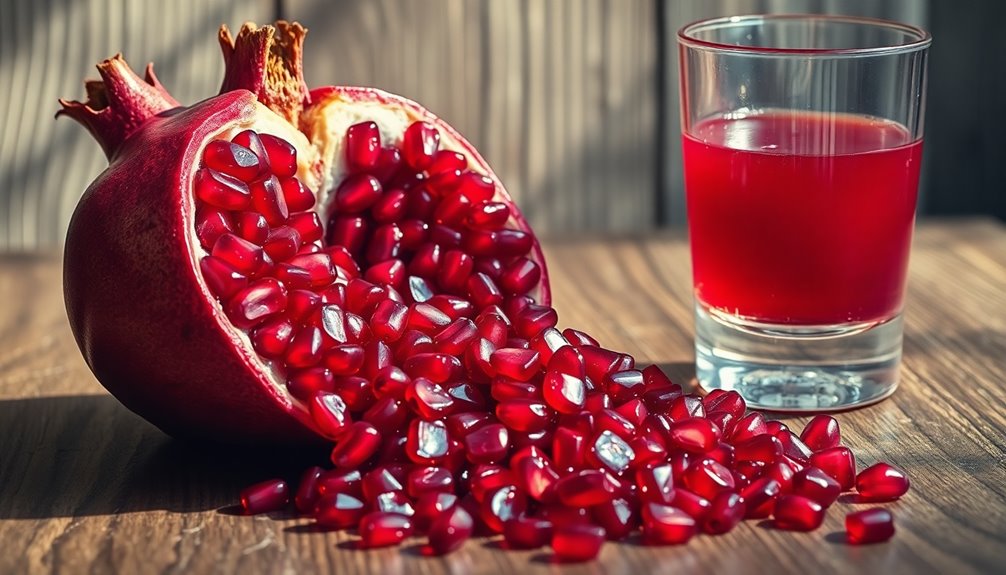When you enjoy an 8 fl oz serving of POM Wonderful Juice, you're savoring the juice of two whole California pomegranates. This delicious drink is packed with nutrients and antioxidants, making it great for your health. Plus, it's free from added sugars, sodium, or cholesterol. You'll appreciate the remarkable fusion of sweetness and tartness in every sip. Stick around to uncover even more about the benefits and uses of this vibrant juice!
Key Takeaways
- Each 8 fl oz serving of POM Wonderful Juice contains juice from two whole-pressed California pomegranates.
- The juice is made from non-GMO pomegranates, ensuring quality and purity.
- Whole-pressed method maximizes nutrient extraction, providing rich antioxidant benefits.
- Pomegranate juice offers antioxidant power equivalent to multiple servings of common fruits.
- Regular intake supports heart health, boosts immunity, and enhances overall well-being.
The Rich History of Pomegranates
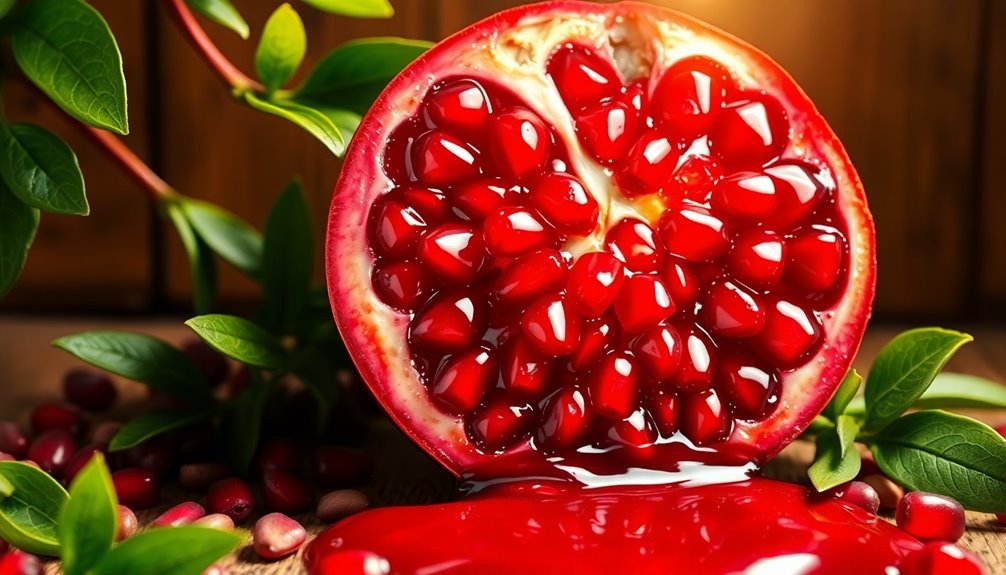
Pomegranates have captivated humans for thousands of years, their origins tracing back to modern-day Iran and its neighboring regions. In ancient cultures, pomegranates symbolized fertility, abundance, and prosperity.
You'll often find them in art and literature, from the Bible to Greek mythology, showcasing their significance throughout history. The fruit was especially revered in ancient Egypt, where it was linked to the afterlife and included in burial tombs as offerings.
As time went on, pomegranates spread to the Mediterranean and Asia, eventually reaching the Americas through Spanish settlers in the 16th century. Today, California stands out as a major producer, with brands like POM Wonderful emphasizing the health benefits and culinary uses of this remarkable fruit. The fruit's health benefits are increasingly recognized in modern nutrition discussions, showcasing its rich antioxidant content and potential health advantages.
Nutritional Breakdown of POM Wonderful Juice
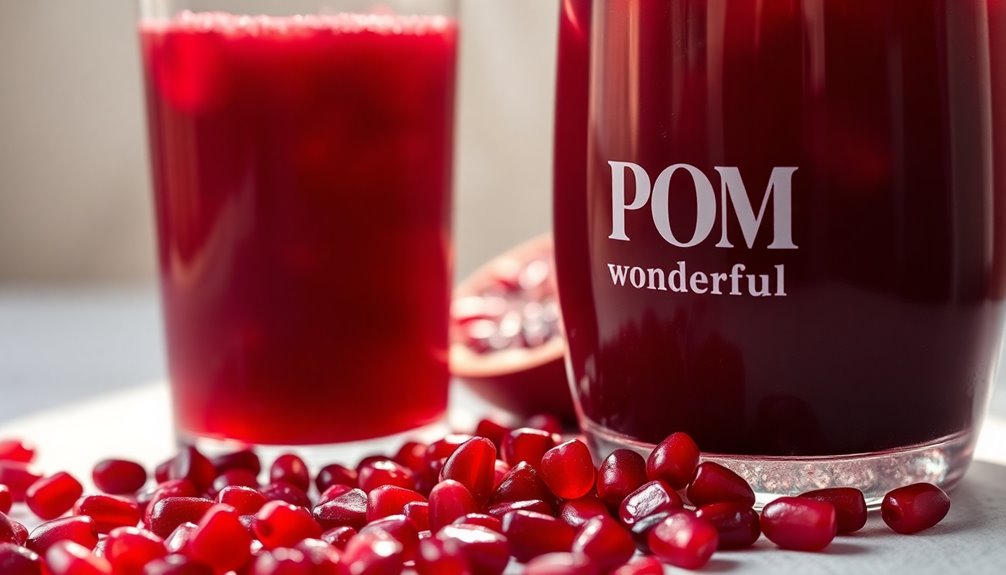
When you pour yourself an 8 fl oz serving of POM Wonderful 100% Pomegranate Juice, you're getting the juice of two whole-pressed, non-GMO California pomegranates, packed with nutrients.
This juice is a fantastic source of potassium, providing about the same amount as an average banana, which helps with hydration and muscle function.
You'll also benefit from its rich antioxidants, particularly polyphenols, that fight free radicals and reduce oxidative stress.
Plus, POM Wonderful juice contains no added sugar, sodium, or cholesterol, making it a heart-healthy option.
With vitamin C included, it supports your immune health, and enjoying a daily serving can maximize these health benefits.
Furthermore, the juice is also known for its potential to reduce the risk of heart disease, aligning with the health benefits associated with tea consumption.
Indulge in this delicious, nutrient-dense beverage!
Antioxidant Power: What Makes Pomegranate Juice Special
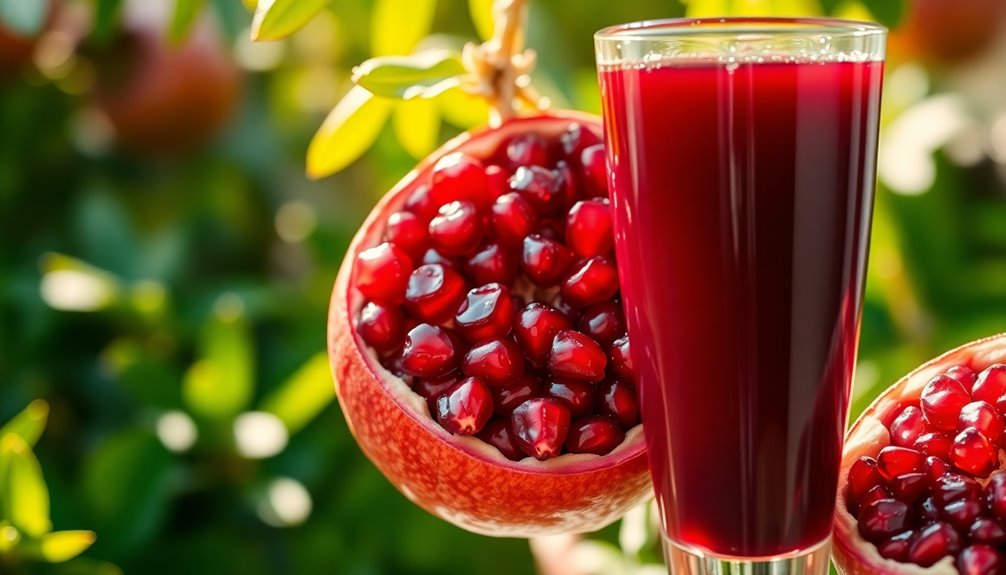
When you enjoy pomegranate juice, you're tapping into a powerhouse of antioxidants that can benefit your health in multiple ways.
Its rich polyphenols not only fight free radicals but also support heart health and memory function.
Let's explore what makes this juice so special and how it can enhance your overall well-being.
Rich Antioxidant Content
Antioxidants play an essential role in promoting health, and pomegranate juice is a powerhouse in this regard. POM Wonderful 100% Pomegranate Juice is loaded with polyphenol antioxidants from the whole pomegranate—rind, pith, and arils—giving you a concentrated source of health benefits.
Each 8 fl oz serving packs antioxidant power equivalent to multiple servings of common fruits, helping combat free radicals that can harm your cells. This juice is also rich in vitamin C and potassium, which supports immune health and counters oxidative stress.
Regularly drinking pomegranate juice can greatly contribute to heart health by lowering blood pressure and reducing cholesterol levels. So, sip on this vibrant juice and enjoy its remarkable antioxidant content!
Health Benefits Overview
Pomegranate juice stands out not just for its rich antioxidant profile but also for the wide array of health benefits it offers.
With each 8 fl oz serving of POM Wonderful, you're consuming the juice from two whole-pressed pomegranates, delivering a concentrated source of nutrients. This juice is loaded with antioxidants, particularly polyphenols, which combat free radicals and reduce oxidative stress in your body.
It's also a great source of vitamin C, essential for immune health, helping you fend off infections. Plus, the significant potassium content supports healthy blood pressure and muscle function.
Regularly enjoying pomegranate juice can enhance heart health and may even support prostate health, making it a tasty addition to your wellness routine. Additionally, the antioxidants in pomegranate juice can further boost your overall health by reducing the risk of chronic diseases.
Free Radical Combat
Packed with polyphenol antioxidants, POM Wonderful 100% Pomegranate Juice is a powerhouse in the fight against free radicals.
Each 8 fl oz serving delivers the antioxidant power of two whole-pressed, non-GMO California pomegranates, making it one of the most potent sources of antioxidants available.
These antioxidants help combat free radicals that contribute to oxidative stress, which can lead to various health issues.
Regularly consuming POM juice not only supports heart health and reduces inflammation but also boosts your immune system thanks to its significant vitamin C content.
By choosing POM Wonderful 100% Pomegranate Juice, you're giving your body the tools it needs to combat oxidative stress and maintain overall health.
Enjoy the antioxidant benefits today!
Health Benefits of Regular Pomegranate Juice Consumption
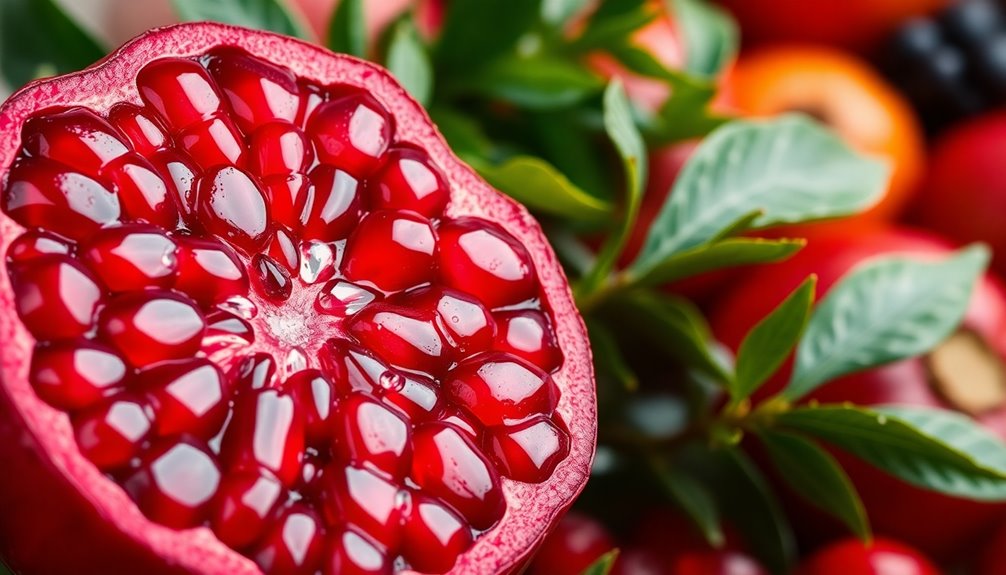
When you incorporate POM Wonderful 100% Pomegranate Juice into your daily routine, you open the door to a wealth of health benefits. This delicious juice is packed with antioxidants which help combat free radicals, reducing oxidative stress in your body.
Plus, each 8 fl oz serving is a potassium source, equivalent to an average banana, which supports healthy muscle function and hydration.
Here are some key benefits you'll enjoy:
- Boosted immune health thanks to high vitamin C content
- Enhanced heart health by lowering blood pressure and cholesterol levels
- Potential prostate health benefits for men
- Overall improved well-being from regular consumption
Make POM juice a staple for a healthier you!
Flavor Profile: Sweetness and Tartness in Every Sip

Indulging in POM Wonderful 100% Pomegranate Juice offers a delightful journey through its unique flavor profile, blending sweetness and tartness in every sip.
This juice captures the essence of whole pressed California pomegranates, ensuring you experience the true flavor of freshly pressed fruit. Each 8 fl oz serving contains juice from TWO handpicked pomegranates, delivering a healthy dose of vibrant taste.
You'll find the sweetness is naturally balanced, never overpowering, while the tangy notes keep your palate refreshed. Many customers rave about the smooth texture, making a delightful sip of POM perfect on its own or as a mixer in cocktails and mocktails.
Enjoy this rich, flavorful beverage that satisfies your thirst for something health-conscious and delicious.
Culinary Uses for Pomegranate Juice
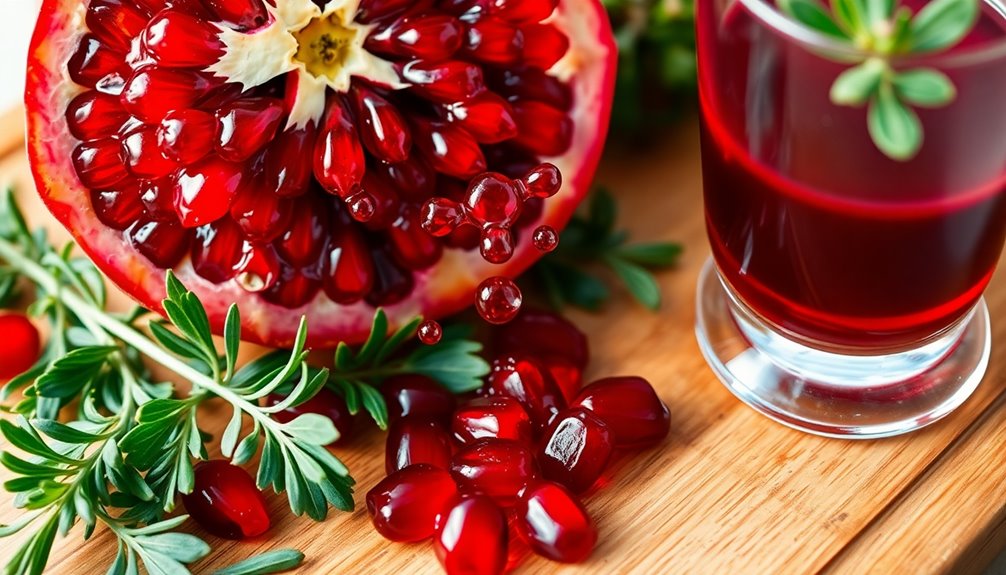
The versatility of POM Wonderful 100% Pomegranate Juice extends far beyond just a revitalizing drink.
You can creatively incorporate it into your culinary adventures, making your dishes more vibrant and flavorful.
Here are some fantastic culinary uses for POM Wonderful juice:
- Marinade for meats, enhancing flavor and tenderness.
- Salad dressings that offer a rich, tangy complement to greens.
- A nutritious boost in smoothies, packed with antioxidants and potassium.
- An exciting cocktail mixer for invigorating drinks or mocktails.
You can even use POM juice in desserts, like glazes or sauces, adding delightful sweetness and a striking color.
Now, elevate your cooking and impress your guests with these amazing uses!
Sustainability and Sourcing of POM Wonderful Products
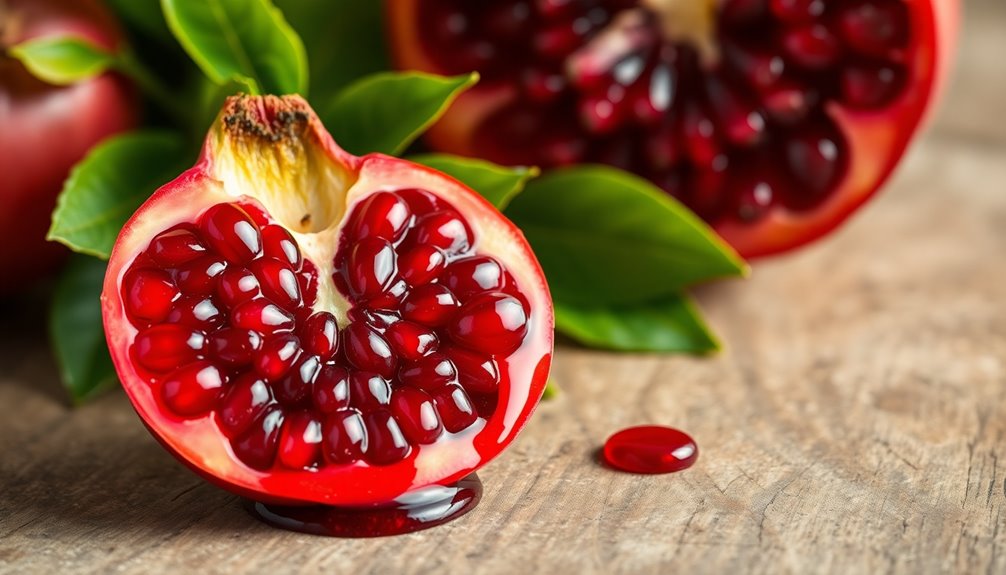
POM Wonderful prioritizes sustainability and ethical sourcing, ensuring that you enjoy not just delicious juice but also a product that respects the environment.
Sourced from 9,000 acres of California orchards, POM's pomegranates are non-GMO and cultivated using sustainable farming practices. This commitment to environmental stewardship means they focus on preserving natural resources while producing high-quality fruit.
The whole-pressed juice utilizes every part of the pomegranate, maximizing nutrient extraction and minimizing waste. POM also emphasizes quality control, rigorously testing each batch for purity and antioxidant content.
Frequently Asked Questions
How Much POMegranate Juice Is in POM?
When you ask how much pomegranate juice is in POM, you're looking at an 8 fl oz serving that contains juice from two whole-pressed California pomegranates.
This means you're getting the full benefits of the fruit, including valuable polyphenol antioxidants. Plus, it's free from fillers and added sugars, so you're enjoying pure, natural juice.
Each serving also provides potassium, supporting your hydration and muscle function. Enjoy every sip!
Is POM POM Real POMegranate Juice?
Imagine biting into a ripe pomegranate, its juice bursting with flavor. That's what you get with POM juice—it's real pomegranate juice.
It's made from whole-pressed, non-GMO California pomegranates, ensuring you savor the authentic taste without fillers or added sugars.
Each 8 fl oz serving is packed with the goodness of two whole pomegranates, delivering not just flavor but also health benefits like antioxidants and potassium.
You're truly enjoying the essence of pomegranate.
How Much Pomegranate Juice Is in One Fruit?
When you cut open a medium-sized pomegranate, you can expect to get about 1/2 to 3/4 cup of juice, roughly 4 to 6 ounces.
This juice comes from around 600 to 800 seeds inside the fruit.
Depending on the variety and ripeness, the juice might account for about 50-60% of the pomegranate’s total weight, making it a delicious and nutritious addition to your diet. Incorporating pomegranate juice into your daily routine not only enhances the flavor of your meals but also boosts your overall health. Recent studies suggest that pomegranate juice and erectile health may be linked, as the antioxidants present in the juice can improve blood flow and circulation. This makes it an appealing choice for those looking to enhance both their diet and intimate wellness.
Enjoy the rich flavor packed in each fruit!
Who Should Not Drink Pomegranate Juice?
You should avoid drinking pomegranate juice if you have kidney issues, as its high potassium content can worsen your condition.
If you're on blood pressure or blood-thinning medications, consult your healthcare provider before consuming it, since it may interact with those drugs.
Additionally, if you have diabetes or high blood sugar, be cautious due to its natural sugars.
Pregnant women and individuals allergic to pomegranates should also steer clear of this juice.
Conclusion
In every sip of POM Wonderful juice, you're not just tasting a drink; you're savoring centuries of rich history and vibrant health benefits. Packed with antioxidants and flavor, it's like a burst of sunshine in a bottle, brightening your day and nourishing your body. By choosing POM, you're supporting sustainable practices while treating yourself to nature's own elixir. So, raise your glass and celebrate the passion of pomegranates—your health deserves this delicious indulgence!
Susannah expertise lies in researching and compiling evidence-based content on juicing, nutrition, and overall health. She is committed to ensuring that The Juicery World offers accurate, up-to-date, and trustworthy information to empower readers to take control of their health. Susannah’s goal is to inspire individuals to embrace juicing as a way to nourish their bodies and live their best lives.

